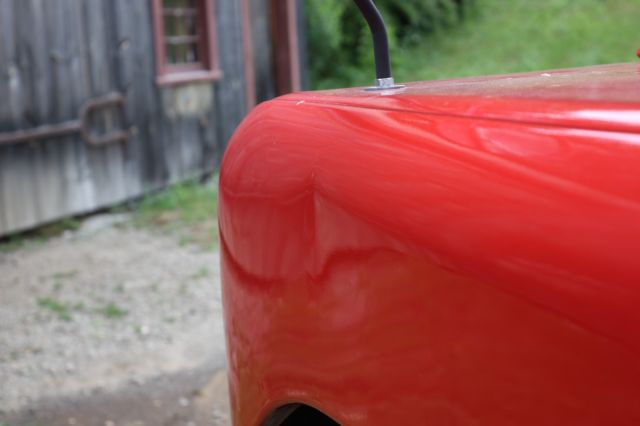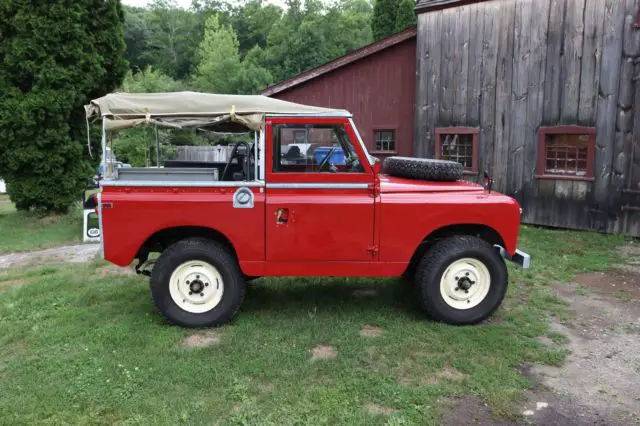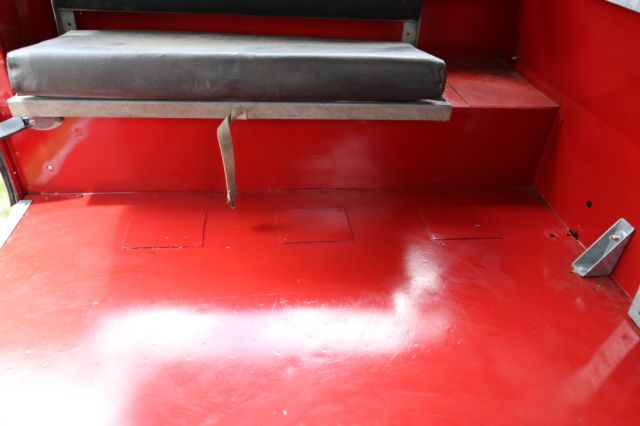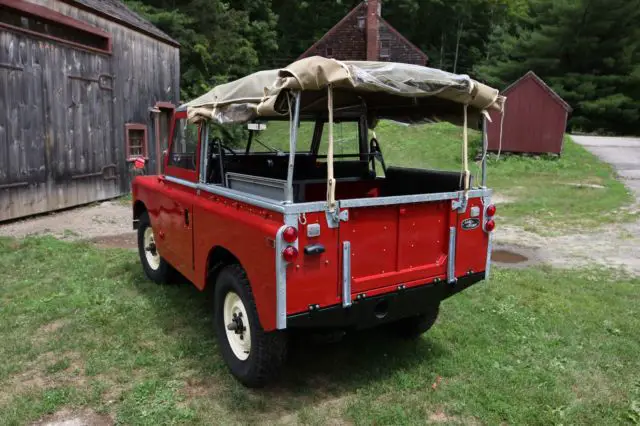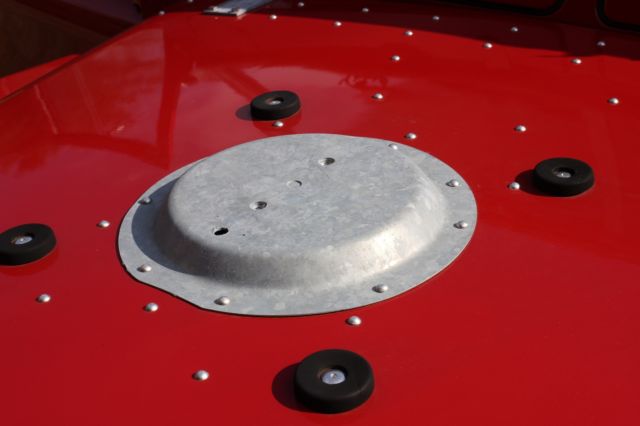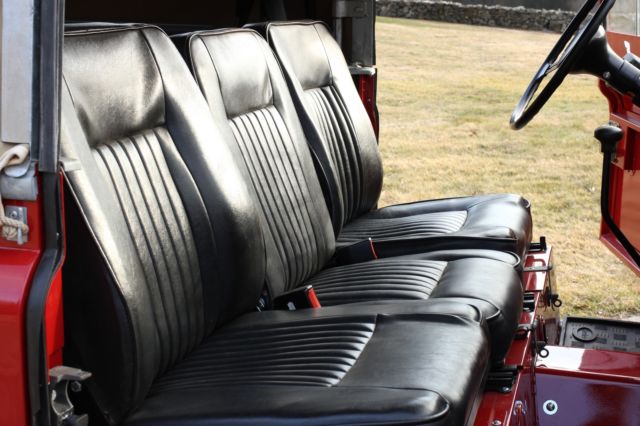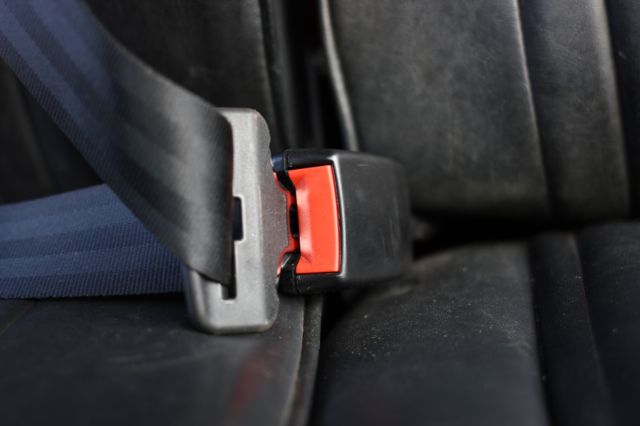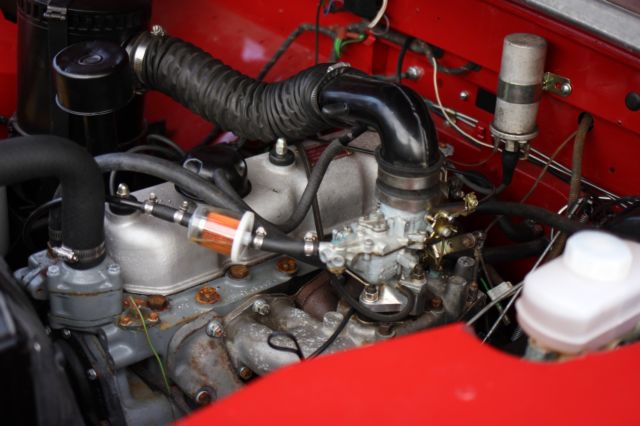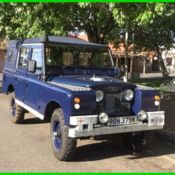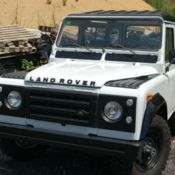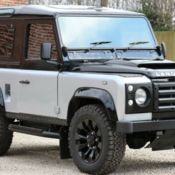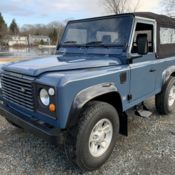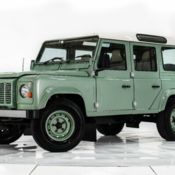1959 Land Rover Series II Soft Top Recently Restored
| Condition: | Used |
| Make: | Land Rover |
| Model: | Other |
| Type: | Convertible |
| Trim: | Series II |
| Year: | 1962 |
| Mileage: | 46,112 |
| VIN: | 144902439 |
| Engine: | 2.25 gasoline |
| Cylinders: | 4 |
| Fuel: | Gasoline |
| Drive type: | 4WD |
| Vehicle Title: | Clear |
| Item location: | Monroe, Connecticut, United States |
| Extras |
|
4-Wheel Drive, Convertible |
| Listed by | Private seller |
Description of 1962 Land Rover Other |
|
1959 Land Rover Series II 88’’ in Poppy Red Here is a 1959 Land Rover Series II that has undergone a frame off restoration. The goal of the restoration was to return the Rover to its original factory appearance but with a few minor upgrades to its mechanical systems. Body The body was repainted in poppy red, it was painted just like it was originally, in single stage enamel with some orange peel. There is some body filler in the quarters and front fenders, there are still a few small dents and dings left throughout the body. The doors and tailgate are new. The bulkhead was removed, bead blasted and all new repair panels welded in. All cappings were removed from the body panels, galvanized and riveted back on with correct hammer rivets. The rear tub had some holes rotted through where the aluminum floor meets the steel underbody supports. The rot was cut out and aluminum plates riveted on to cover the holes then new steel underbody supports we installed. All steel parts like the windshield frame and hood hinges were also regalvanized. Some parts that were not originally galvanized like the hood frame and under seat storage box were galvanized in the interest of longevity. The windshield glass is new, the door tops have new felts for the sliding glass, the soft top and hoop set are new. The door latches have been upgraded to the later antiburst style latches for safety and unlock with the ignition key. All the weatherstripping is new. All exterior bolts are either galvanized or stainless. The tire on the hood is a NOS 6.50 16 bias ply similar to the original tires. Engine The engine seemed to run good when we got the truck, the cylinders looked ok with no ridge at the top or major scoring, the crank journals looked good with no scoring. I simply installed new rings and connecting rod bearings, water pump, timing chain and a new front and rear main seal. It was converted to a weber carburetor. The engine runs good but does have some piston slap. Boring it out and fitting new pistons would solve this but it still runs great as is. The head was completely rebuilt with hardened valves to run on unleaded gas. Transmission and Transfer Case Series II Rovers have a transmission with an unsynchronized 1st and 2nd gear which requires double clutching when shifting. I opted to change out the transmission for a Series III unit from a low mileage early 80s 109’’. So now it can be shifted just like any normal car through all 4 gears. I did retain the correct series IIa shifter though. The clutch, clutch fork, throwout bearing, slave cylinder and master cylinder where all replaced. The clutch hose is also new and the clutch line is stainless steel. It does not have an overdrive so top speed is around 60mph, cruising speed is around 50mph. Axles The axles were completely disassembled; the differentials were inspected for any obvious wear and checked out OK. The axle housings were stripped and repainted in chassis black. The u-joints were inspected for wear, all new drive flanges were installed on the axles. All worn wheel bearings were replaced, they were repacked with Mobil one synthetic grease and new seals added, new seal races were added to the spindles. The swivel balls were in great shape and free of any rust, new swivel seals and retainers were added. The drive shafts were rebuilt with new U joints. The tires are BF Goodrich All Terrains in size 235 85 16, they are taller than the original tire size but still fairly narrow. The wheels are the original 16’’x5’’ painted in limestone. Suspension New leaf springs were installed front and back, new shackle bushings were pressed into the frame, all new shackles and bolts were used. New U bolts were used on the springs and new shocks were installed Frame The frame was sandblasted. Some rust was found on the lower front part of the right hand frame rail, the rust was cut out and new steel welded in. The frame also had a new rear crossmember welded on at some point in its past. Once the repairs were made, the frame was epoxy primed and painted in chassis black. Interior Some original late Series IIa deluxe seats were added, unlike the earlier seats these have sliding tracks and better bolstering. There are jump seats in the back. Like the outside of the body, the inside was repainted as well. The gauge cluster was disassembled so that the gauge bezels could be painted. There are new floor mats front and back. The Rover has had new Defender shoulder harness seat belts added to the front seats. A seat belt bar was used to locate the seat belts in the right position over the shoulder, this is something original Series Rovers did not have. The original banjo steering wheel was repainted and, besides the all metal dash, is one of the best things about the interior of a Series IIa. Steering The steering knuckles were set up with correct amount of preload. The steering relay was also checked to ensure the correct amount of drag, 6 new tie rod ends were added. All this adds up to a Rover that steers and tracks beautifully Brakes The Rover was converted to dual circuit power brakes, this was not available until years later on a series IIa. The conversion made use of a NOS late series IIa/ III brake pedal box. A new late IIa/III master cylinder and brake booster was added as well as a NOS brake light switch. The right hand fender had to be cut for the master cylinder, this was done exactly as it was done on later Series IIa rovers with a lip formed on the edge. All new stainless steel brake line were added. The brake backing plates were removed and repainted. New brake shoes were installed as well as new wheel cylinders, springs and brake hoses. The original brake drums were resurfaced. Electrical A complete new wiring harness and fuse box was installed front to back. There is no vestige of the old wiring left over, it is all brand new. It has the correct cloth covered harness like the original except it was made specifically for use with an alternator instead of a generator. All the lights were replaced with the exact same type that it came with originally. The front parking lights and turn signal lenses are glass and say ‘’Made in England’’ on them. The rear lights are the correct Lucas type with a chrome bezel and say ‘’England‘’ on the lenses. Later style series IIa reverse lights were added for convenience and say ‘’Lucas’’ on the lenses. The Rover has a new alternator, a new push button starter switch, all new battery cables and an Optima yellow top battery. Fuel System The entire fuel system is new. A NOS gas tank was installed with new factory fuel line from the tank to the pump. The fuel pump was updated to the later type without the glass bowl. A new Weber carburetor was added and all the throttle linkage changed to the later Series IIa type to work with a weber carburetor. This land Rover runs and drives great, it has been driven about 100 miles since completion and will probably still need addition tuning, brake adjustments etc. New soft top and hoop set original rear jump seats refinished pedals refinished banjo wheel original deluxe seats from a late series IIa New 4x4 lever knobs, new starter button restored dash original shift lever galvanized exterior bolts all exterior steel pieces have been regalvanized original Lucas tail lights and turn signals, say ''Made in England'' on the lenses many brackets underneath are galvanized for corrosion resistance the five original 16''x5'' steels wheels have been repainted in limestone. The tires are 235 85 16 BF Goodrich all terrains with 85% tread. The spare tire is a NOS 6.50 16 firestone which is the original tire size the door latches have been upgraded to series III bearclaw style latches, they also have locks which open with the ignition key. The doors have the correct hammer rivets the windshield frame has been sandblasted and galvanized and it has new glass the hood has the correct hammer rivets, installed after the hood was painted the vent flaps are from a series IIa and have new series III weatherstripping. The hood hinges have been regalvanized the windshield wiper motors are the original type the parking lights are new Lucas units that say ''England'' on the glass lenses the fender are original and have some dings and dents The axles have been rebuilt including the front swivels housings which where shimmed to the proper preload. all new tie rod ends were installed correct original glass lenses the hood had its steel frame removed from the aluminum skin and galvanized the original series II 2.25 gas engine. The timing cover was changed to a series IIa type so that replacement waterpumps could be more easily sourced. The head was replaced with series III head with slightly more compression. An original type cloth wiring harness was used, the harness was specially made to appear original but to be used with an alternator instead of a generator. The electrical system was changed from positive ground to negative ground. the engine was detailed The engine was converted to run on a weber carburetor using all late series IIa factory parts the engine has the original coolant shut off valve for the original series II heater The cloth hood buffer is new and the hood latch mechanism has been refinished the original oil bath air cleaner has been refinished and has had its wire mesh filter cleaned and new oil added to the oil bath the brake system has been converted to the late series IIa dual master cylinder and power brakes. All brake lines are stainless steel. The fender was modified in a jig exactly as the late IIa fenders were, to clear the dual master cylinder a new series III alternator was added in place of the old generator The engine has had new rings and bearings installed as well as all new seals and gaskets. The engine does have some piston slap caused by worn cylinders or pistons. These are very primitive motors very similar to a tractor engine. Everything underneath has been repainted as well The brakes are completely new, the shoes, springs, hoses, wheel cylinders have all been replaced. The drums have been resurfaced. The axles have been completely disassembled and the housings repainted The differentials were removed and inspected for wear. The pinion seal and drive flange were replaced both front and rear The spring and shocks and u bolts are all new The sills were sand blasted and regalvanized new weatherstripping was added all around shoulder harness seat belts were added as well as a mounting bar to give the seat belts the correct mounting position over the driver and passengers's shoulders all new hardware was used on the bulkhead the seat frames were refinished and the under seat tool box was galvanized All new floor hardware was used A Series III cylinder head was used for increased compression and was converted to run on unleaded fuel by the addition of hardened exhaust valves and hardened valve seats The Land Rover was painstakingly assembled one piece at a time A series III fully synchronized transmission was used and all new clutch components were installed The flywheel was resurfaced A late series IIa rear tub was used. All the under body supports were replaced. The aluminum floor had some holes rotted through that were patched The bulkhead was badly rotted so new floors were installed |
 Home
Home Contact us
Contact us NEWEST CARS
NEWEST CARS SELL YOUR CAR
SELL YOUR CAR FAQ
FAQ
